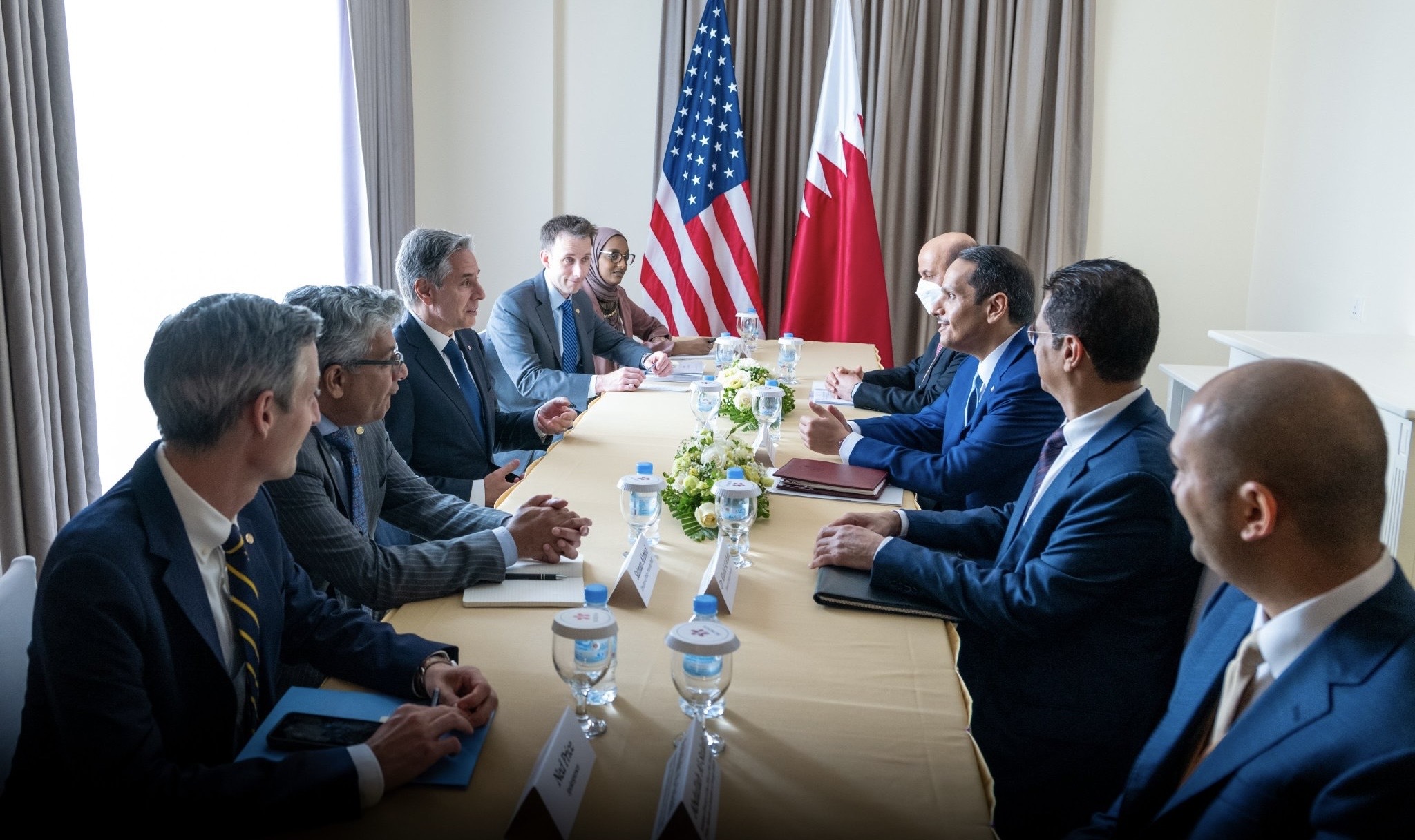Several foreign ministers attended the meeting in Phnom Penh.
Qatar’s Foreign Minister Sheikh Mohammed bin Abdulrahman Al Thani met with his US counterpart Antony Blinken in Cambodia on Thursday, where they discussed issues of common concern.
“We had an opportunity to just spend some time talking about a number of them, to include Afghanistan, to include Iran, to include some other regional issues, and of course to talk a little bit about the work that we’re doing here in Cambodia,” said Blinken.
The diplomats are both in Cambodia for the Association of Southeast Asian Nations (ASEAN) meeting, held at the level of foreign ministers. Sheikh Mohammed also met with his Turkish counterpart Mevlüt Çavuşoğlu along with other diplomats on the sidelines of the event.
The latest meeting between Sheikh Mohammed and Blinken came after Qatar hosted two-days of indirect talks between the US and Iran in June. The negotiations aim at restoring the 2015 nuclear deal, technically known as the Joint Comprehensive Plan of Action (JCPOA).
The talks took place after initially kicking off in Vienna in April last year, though those rounds yielded no results as both sides continued to trade blame over the compliance with the accord.
The talks resumed on Thursday for the first time in Vienna since March.
“I think our discussion today is very important for the security of our region and we really appreciate the relationship and the partnership and the commitment that the US has toward our region. So thank you very much,” Sheikh Mohammed told Blinken.
Following the Taliban takeover of Kabul in August last year, Qatar was able to carry out history’s largest airlift of people. The Gulf state had evacuated more than 70,000 Afghans and foreigners from the country.
Qatar and the US also signed an agreement during the latest Strategic Dialogue late last year, enabling the former to represent Washington’s interest in Afghanistan in light of the US closing its embassy following the Taliban takeover.
The Gulf state also hosts the Al-Udeid Airbase, the largest American military post in the region.
In recognition of its key role in Afghanistan, US President Joe Biden designated Qatar as a major non-NATO ally (MNNA) this year after he met with the Gulf state’s leader, Sheikh Tamim bin Hamad Al Thani in Washington.
Qatar became the third Gulf country to be added to the list of 17 current MNNA’s, which already includes Bahrain and Kuwait.
ASEAN meeting
Meanwhile, Qatar’s foreign minister signed the ASEAN Cooperation on the sidelines of the meeting with his counterparts from the participating nations in Phnom Penh. ASEAN was established in 1967 by Indonesia, Malaysia, Philippines, Singapore and Thailand.
“Qatar’s accession to the treaty stems from the common will and desire to create a safe and stable area for societies to achieve sustainable economic development and common prosperity,” said the Gulf state’s foreign ministry.
Sheikh Mohammed and Cambodia’s Prime Minister Hun Sen also reportedly discussed resuming flights between the two nations to promote tourism. The flights were stopped in light of the Covid-19 outbreak, which disrupted travel across the world.
The ASEAN meeting also focused on the ongoing crisis in Myanmar, where three anti-coup members were executed a week ago. ASEAN’s special envoy was also not allowed to meet Myanmar’s democratically-elected leader Aung San Suu Kyi.
“ASEAN member states must recognise that the Myanmar military has become a criminal organisation that is holding hostage the whole of the country’s population,” Eva Sundari, a former member of the House of Representatives in Indonesia said on Tuesday.
The coup began with the detainment of Suu Kyi, President Win Myint and other senior figures from the National League for Democracy (NLD) last year.
The military attempted to justify the arrests saying it was in response to election fraud, granting power to army chief Min Aung Hlaing and replacing 24 ministers and deputies with 11 new members.
Since then, anti-coup protests have erupted across the country with those opposing the military rule facing raids, censorship and arrests. According to Al Jazeera, the military cracked down on more than 2,000 opponents.







